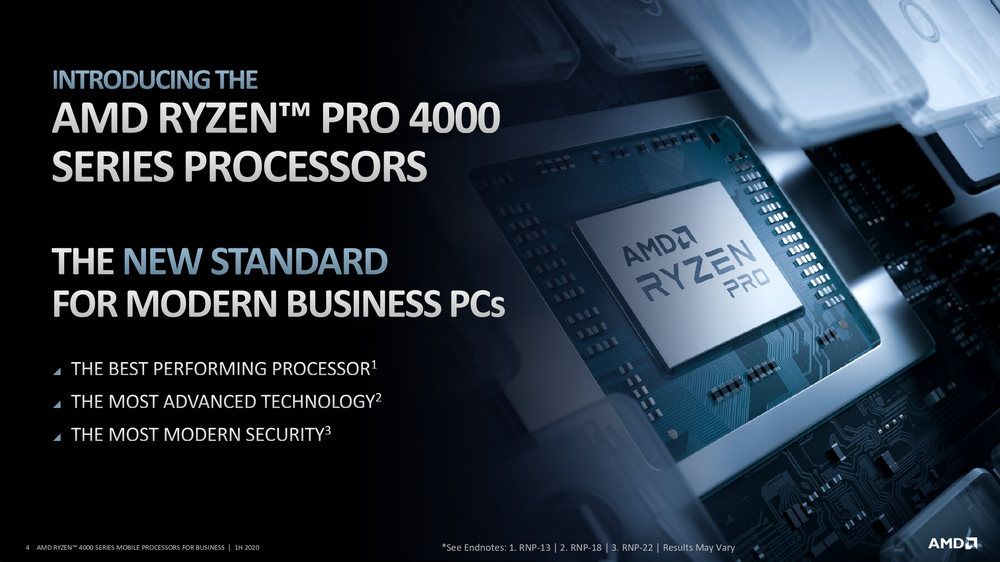The new generation of Ryzen Pro 4000 processors for laptops has arrived. AMD officially introduces three models that mark the beginning of the new Pro Series with Zen 2 architecture and a 7nm process node.
AMD Ryzen Pro 4000 comes with the models: Ryzen 7 Pro 4750U / Ryzen 5 Pro 4650U / Ryzen 3 4450U
The new AMD Ryzen Pro 4000 consists of the 8-core 16 threads Ryzen 7 Pro 4750U, the 6-core 12 threads Ryzen 5 Pro 4650U and the 4-core 8 wire Ryzen 3 4450U processors. As they are suitable for business and professional laptops, they come standard with a 15W TDP. AMD estimates that the battery life with the Ryzen 7 4750U is over 20 hours!
The Ryzen 7 Pro 4750U would naturally replace the 3700U (4-cores 8-threads) model of the previous generation, the 4650U is the natural replacement for the 3500U (4-core 8-threads) and the 4450U would replace the 3300U 4-core 4-threads model. AMD is significantly increasing the number of cores and threads in the Pro Series, which should mean a quantum leap in performance for all multi-threaded tasks.
Generation-to-generation comparisons are inevitable, and AMD is taking this opportunity to highlight the incredible performance gains possible with the increased cores, frequencies, and Zen 2 architecture.
Performance Comparisons
Here is a comparison in Cinebench R20 in a single thread, multi-thread and 3DMark Time Spy with the Ryzen 7 Pro 4750U vs. 3700U. The improvements are very significant, especially in multithreading with +132% performance.
We can also see the performance improvements achieved with more office tasks, Microsoft Word, PowerPoint, Edge, Excel, and PCMark 10 App Score, where we see average improvements of over 30-40%.
Comparison with Intel i7-10710U / i5-10210U
As expected, AMD has not missed the opportunity to make a comparison with competing laptop (U) processors based on the tenth generation of core processors. First, the Ryzen 7 Pro 4750U (8N/16H) was compared in synthetic tests with the Intel Core i7-10710U (6N/12N). The advantage of the AMD option is obvious, although it has an advantage due to the number of additional cores.
The other comparison was made between the Ryzen 5 Pro 4650U (6N/12H) and the Core i510210U (4N/8H). We also see an advantage here due to the additional amount of cores, but we imagine that this comparison is based on the fact that both fight in the same price range.
In the third comparison, AMD now takes the Ryzen 5 Pro 4650U and the i7-10510U, both 6-lead, 12-lead, for fairer testing at the specification level. Nevertheless, it still wins AMD’s choice in 3DMark, Geekbench and Passmark 9 CPU tests by over 30%.
Increased security, Vega graphics and more
AMD’s official announcement announces 6 laptop models that will use the new Ryzen Pro 4000 processors, 2 HP and 4 Lenovo.
Because the chips are targeted at the business and professional sector, they have additional security features, namely the AMD Secure Processor and AMD Memory Guard. The latter completely encrypts the memory to prevent it from being read by attackers. These are additional security measures to those that the Zen architecture already has in all processors.
Of course, all three Ryzen Pro 4000 processors are equipped with an integrated 5-core, 6-core, and 7-core Vega iGPU, with Ryzen 7 Pro 4750U being the most advantageous. The GPU frequencies of this processor reach 1600MHz, while the other two are 1500MHz and 1400MHz.
This completes AMD’s portfolio of Zen 2-based notebook CPUs, which promises to be a success this year. We will keep you up to date.
